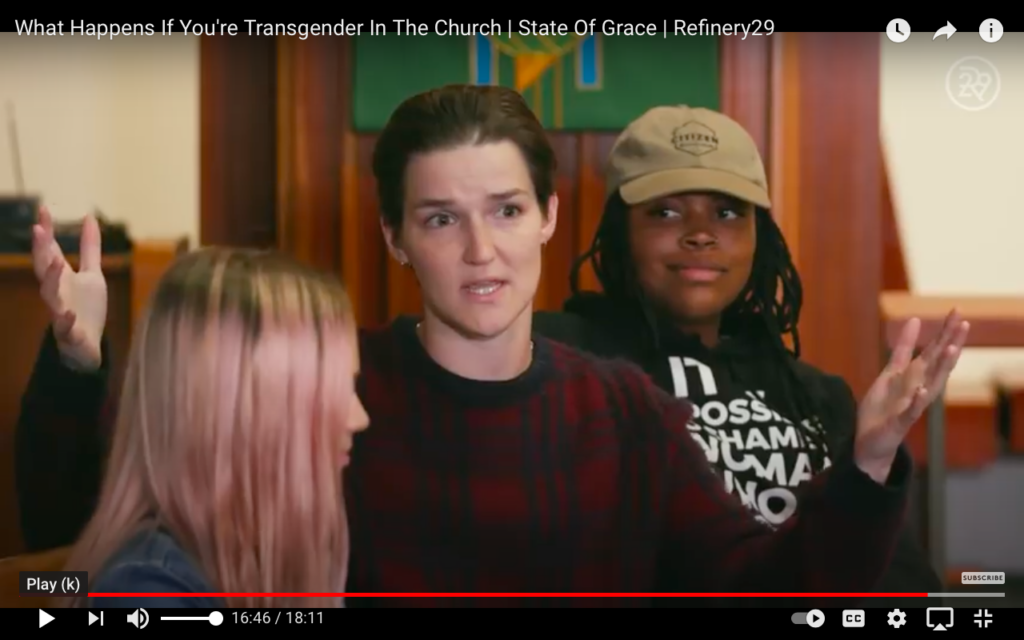I’ve been looking — for quite a while now — for a teaching resource of some kind that shows how some Christians and some Christian groups do in fact support persons of non-binary gender.
The anti-LGBTQ+ Christians are loud and vocal, and they dominate both media and the popular imagination. But I know there are plenty of progressive Christians who feel their religion is fully compatible with being LGBTQIA+. Unfortunately, as is so often the case in our society, most people think it’s a zero-sum game, so the loudest group gets to take charge of the discourse. In addition, as is so often the case in our religiously illiterate society, everyone seems to assume that all religions are monolithic; everyone assumes that one Christian group gets to represent all Christian groups everywhere, ignoring the fact that Christianity has tremendous internal diversity.
As a religious educator, I’ve long tried to teach people both about Christianity’s internal diversity, and about how some Christians are fully supportive of LGBTQIA people. But in a the context of our zero-sum-game, religiously-illiterate society, I haven’t had much success. I kept thinking: If only I had some great teaching resource that showed how some Christians do not have a binary understanding of gender.
So I was pleased to discover this video, which profiles several interesting non-binary Christians. The interviewer, Grace Selmer Baldridge, happen to be a non-binary Christian, which I think makes this video especially powerful. I could wish that Grace Baldridge had been able to interview some non-white non-binary Christians, but aside from that weakness, the interviewees are diverse in their gender identity, in their age, in their expression of their Christianity.
This video may not work well as a teaching resource for those Unitarian Universalists who suffer from anti-Christian bias. Nevertheless, I’m thinking this video could be a great teaching tool for showing both the internal diversity of Christianity, and showing how some Christians believe their religion calls them to a non-binary understanding of gender.

To whet your appetite, here are some quotes from the video:
“We just have to be honest that using the pronoun ‘he’ for God is a habit, but it has no theological justification.” — Dr. Lizzie Berne DeGear, independent scholar
“When I imagine a trans child coming to understand, ‘I might be a girl in this boy body,’ I’m like, ‘Thank you, God, the child is becoming aware of who they really are.’…. God creates out of love. God creates love out of love. We who are in the image of God are all awesome. So when I’m talking to you, I’m learning a little more about God. Because you’re in God’s image. And when you’re talking to me, the same is true.” — Rev. Dr. Jacqueline J. Lewis, senior minister, Middle Collegiate Church
“As a church, we said: We’re publicly going to affirm the LGBTQIA community. We don’t have to be uniform in that belief right away, we can question it, we can disagree, but this is the stance our church is going to take from here on out.… We lost lots of people. We lost thousands of dollars. And it was such a good move. We can sit here and be comfortable, and say OK, the money’s still rolling in and there’s a lot of people coming through my doors, and we can feel good about that. But when there’s literally people out there who are told that they’re not loved, people whose families are disowning them for this, we need to step up and become safe spaces.” — Jonathan Williams, former lead pastor, Forefront Church, Brooklyn, and son of a trans woman
“We really feel that the only way we can combat that negativity [about LGBTQIA people] is with people of faith standing up and saying: No, this is actually not in alignment with how we understand our faith, that you can be Christian and trans, and you can be Christian and gay, and that they’re not mutually exclusive.” — Jamie Brusesehof, mother of a trans child
